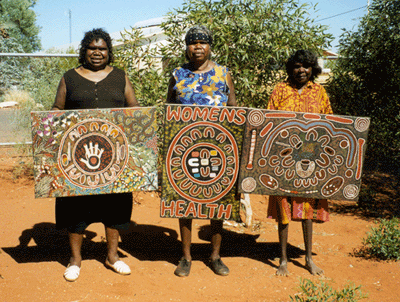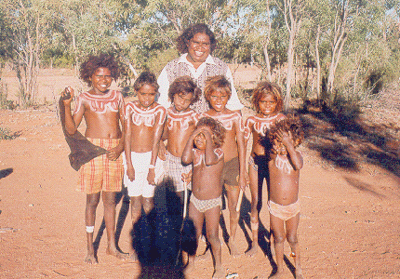Commission WEBSITE: Healthy Community Projects
Rural Health examples
Nyirrpi Grandmothers' Women's
Health Program
Women's health business is the business of the Grandmothers
and the Aboriginal health workers together. The health service staff have
to understand that the Grandmothers are the right people to be in charge
of women's health business
(Nola Wilson, "The Nyirripi Grandmothers' Women's Health Program", Aboriginal
and Islander Health Worker Journal, Vol.23, No.3, May-June 1999, pages
3-5).
Aims
- To keep women's health strong in Nyirrpi.
- To honour the Grandmothers' authority over women's health.
- To obtain the Grandmothers' advice on women's health services,
including advice to the Northern Territory Health Service.
- To strengthen community control of the health services.
The Program aims
to address the many health problems such as poor nutrition, sugar diabetes,
cancer and sexually transmitted diseases that are prevalent in Aboriginal
communities.

Image
L-R: Nola, Valerie and Margaret with paintings they did as part of
their evaluation of the Grandmother's Program, 1997.
What the Program does
Health professionals
were not working effectively with Aboriginal communities to alleviate
their health problems. Now the Grandmothers in the community work with
health professionals to create awareness and share their knowledge about
women's health business. Working alongside the Aboriginal Health Worker
and a community nurse, the Grandmothers have created a safe and respectful
environment where women's health issues can be discussed and treated.
Nola Wilson is the
Program's Aboriginal Health Worker.
I became interested
in working as an Aboriginal Health Worker because there was no-one at
Nyirripi to do women's health ... I used to get the women to come and
see the community nurse. The women would listen to me because I spoke
Walpiri to them and I speak slowly. They used to get shy of the Kardyia
[white] sister because she only came sometimes. I wasn't working then,
but I used to help her get the women. Then she asked me to become a
health worker, so we went to the council to ask. They said yes.
It was hard
for me being women's Aboriginal Health Worker. Some didn't listen to
me when I talked to them about women's health business because they
only listen if the Grandmothers tell them. The Grandmothers didn't know
about Kardyia women's health business.
One day in 1995
Valmai, the Women's Health sister, asked me and another Aboriginal Health
Worker to go around and ask some of the women to come for their health
checks. Some of the old women got cross and hit us with sticks. Those
old women did not know what women's checks were all about. They thought
they were STD checks, and they thought we were cheeky for talking to
them about those things. It was hard to get young women and old women
to come for their women's checks. The women used to be scared and cross
when they would see that Kardyia women's health sister come. They used
to say, "tell that woman to stay away from us".
But not now.
After this Colin [the community nurse] and Valmai talked with me about
starting the Grandmothers' Program. We talked to the Nyirripi women
about it and we chose Valerie and Alice to be the Grandmothers to help
me and Valmai to do things right away. We chose Valerie as the Walpiri
Grandmother and Alice as the Pintubi Grandmother, so all women would
be represented. We had a big meeting in the women's centre. Valerie
told the women what the health checks were for. We talked about a woman
who had passed away from that cancer. At that meeting there were a lot
of Grandmothers. They said it was alright for me to do young women,
but Valmai must do the older women. Now the women are happy to have
their checks from Valmai and me. Now that we have the Grandmothers'
Program it is easier to get all the women to listen to me. If I talk
once to a young girl and she says no, then I ask the Grandmothers to
talk to them. They always listen to the Grandmothers.
An integral part
of the Program is when the Grandmothers, Nola and the community nurse
take the young women and girls out bush and teach them about women's health
business. Nola teaches the women about western women's health ways and
the Grandmothers along with Nola teach the traditional ways of health.
The Grandmothers will also encourage women to go to the clinic for checkups.

Image:
Nola Wilson and young girls from the Nyirripi community
What makes it successful
According to Valmai
McDonald, the Women's Health Educator who helped set up the Program, the
primary reason for its success is the wisdom, commitment and hard work
of Nola Wilson and the Grandmothers involved.
Other factors include:
- Nola and the
Grandmothers include all the women of Nyirripi in the Program's activities.
They do not restrict the benefits to an exclusive group They are very
proud that all the women are involved.
- The community
women accept Nola as teacher and clinician for western style women's
health services.
- The Grandmothers
in charge of the Program help Nola to teach women and girls about
modern day women's health issues and western style women's health
services.
- All the girls
and women of the community want to be involved in the cultural education
activities organised by the senior women as part of the Program.
- Key 'outsiders'
involved in the Program acknowledge the primacy of Aboriginal women's
law and culture.
- Nola and the
Grandmothers work as a team.
- The Grandmothers
and Nola have accumulated good women's health education resources
and they are in control of these local resources.
- The Grandmothers
and Nola have control of the financial resources of the Program. They
manage their own grant money and, among other things, pay for fuel
for the truck to take them out bush, buy food, bought a video camera
to make their own videos and pay for themselves to attend conferences
to talk about the Program.
Difficulties encountered
According to Valmai
McDonald who was the Women's Health Educator, Remote Health, Northern
Territory Health Services and based in Alice Springs when the Grandmothers'
Program was established in 1996, there are unlimited uncontrollable factors,
which make small local Programs very vulnerable. She says,
Many [of the
problems] are to do with remote Aboriginal people being geographically,
bureaucratically, and culturally hemmed in by the alien mainstream.
It is probably impossible for us white fellas to imagine what it is
like for remote Aboriginal people to try to maintain a world that works
when just about every indicator of power and influence is defined from
out of a different world view. It does not matter what you know, it
does not matter what profound wisdom you have about how to care for
each other and your environment: if you can't speak English and you
don't know how to interact with complex mainstream institutions, you
have very limited ability to assert the parameters for a worthwhile
life.
The difficulties
for such a Program are largely to do with the inevitable dependence
of the local people on the goodwill and support of the 'outsiders'.
The Nyirripi Grandmothers' Women's Health Program is self-sustaining
in that it is independent of 'outsider' direction. But it still needs
continuing 'outsider' support because the larger environment within
which the women have to work is not under their control. That's why
'sustainability' does not mean not needing support. It means able to
be maintained and develop in a context of encouragement and helpfulness."
Funding sources
The Grandmothers'
Women's Health Program was developed by the women at Nyirripi in partnership
with the Alice Springs Remote Health Service Women's Health Unit. The
Northern Territory Women's Cancer Prevention Program funds the Program.
